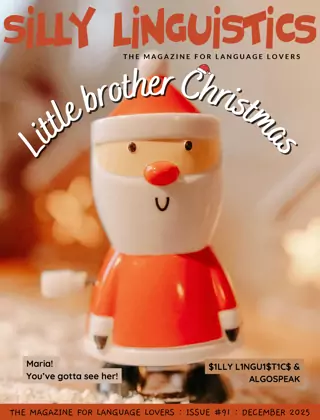
Silly Linguistics Magazine
05 July, 2024
We here at Silly Linguistics love language and linguistics and want to share it with the world. Have you ever wondered why English spelling was so weird? Have you ever wondered where words come from? Well, in this magazine we cover all this and more. We talk to linguists and ask them all sorts of interesting questions about language. We talk to language lovers and talk to them about their highs and lows of language learning. We discuss etymology and where words come from. We look at the social impact of words and how words shape the world around us. Languages are fundamentally human and they touch all parts of our lives. We seek to explore how language shapes our lives and the world around us. How do different groups use language and what can that teach us about being human. Discover all this and more in our magazine Silly Linguistics. You'll find in issue 73: Excerpts from our articles Beyond the Critical Period: Can Older Language Learners Achieve Native-Like Pronunciation? By Faith Huggins “If you have ever studied child language acquisition before, you may have heard of the ‘critical period’ (Lenneberg, 1967) – usually referred to as the age between 0-5 where a child can acquire a first language. Anything after that, and the child will, as studies have proven, never be able to fully grasp a language fully (grammatically and lexically). What I endeavour to shine a light on is the critical period for second language learners regarding accent; this critical period is the period in which a language learner can fully sound like a native speaker. In other words, the research into the question ‘Can I ever sound like a native speaker if I’m an older language learner?’.” How language changes over time – A brief look at two examples By Lydia Pryba “As language changes over time, it undergoes a lot of small changes over the course of centuries. These changes can only be measured many years later, once they have been completed and their consequences have been accepted by those speaking it. A difficulty in measuring language change is the need to collect authentic data. How do we find out what people 1000 years ago have been saying? Was it identical to the written accounts that survived through time? In some cases, we will have to speculate, in other cases linguists collect all the data they can about a certain language family and construct older versions depending on the rules they discover, to get closer to the lost root of a language. In this article, I want to shed light on two important examples of documented and scientifically examined language change. One will be the second sound shift of the German Language, and the other one the long vowel shift of the English language.” Language in Southern Sweden continued: Värmländska, Värmland Finnish, Blå Jungfrun and Öländska By Linden Alexander Pentecost “The traditional Nordic language(s) of Värmland are referred to as Värmländska in Swedish. These languages are highly interesting, for in some senses they reflect an East-Norwegian-like language and show traits typical of southeastern Norway and southwestern Sweden. On the other hand, Värmlandic languages are also unique, and rather surprisingly share some features with northern Nordic languages, such as a degree of apocope. For example, in Hagfors Värmlandic, Rikssvenska hela – ”whole” is heel (1). Another common feature, also found in parts of southeast Norway, is a tendency for ”d” to become “r” in certain words, hence Rikssvenska du – “thou”, de, dom – “they” and då – ”when” can become ru, re and rå.” Asian Man, Native English Voice: A Look into Reverse Linguistics Stereotyping By Qiy “The phenomenon, often called reverse linguistic stereotyping, is where listeners ascribe features to a person’s speech based on their appearance or aspects of their identity. For the man in the video, hearing native English from an Asian woman was surprising. In other cases, listeners believe an Asian speaker has a non-native accent when the speaker is a native speaker.” Tolkien’s Love For Languages Created A New Universe By Albi Haxhiu “Later on in life, the famous ‘dwarves incident’ came. You must have seen the meme; if not, I will elaborate. Supposedly, Tolkien received a letter from his own editor rejecting his draft for the Fellowship of the Ring (1st Lord of the Rings book) for using the wrong plural word for dwarf. According to this meme, his editor insisted that the plural was dwarfs, not dwarves, quoting the Oxford English Dictionary as his source. Tolkien angrily replied that he had written the Oxford English Dictionary, so the editor shouldn’t correct him. However, this was a fabricated lie, because Tolkien and his editor went along well with each other.” Tongues Untied: How Artificial Intelligence is Impacting Multilingual Communication By Nolan Jusayan “The thrust of artificial intelligence brought a new dawn of multilingual communication to be experienced across the globe, vis-à-vis how human beings have been interacting with others who speak a language different from their own. AI significantly enhanced translation services, facilitating and allowing for the prompt delivery of conversation in various languages and encouraging cross-culture understanding through advanced technologies: machine learning, natural processing language, and neural networks.”
...Read more








